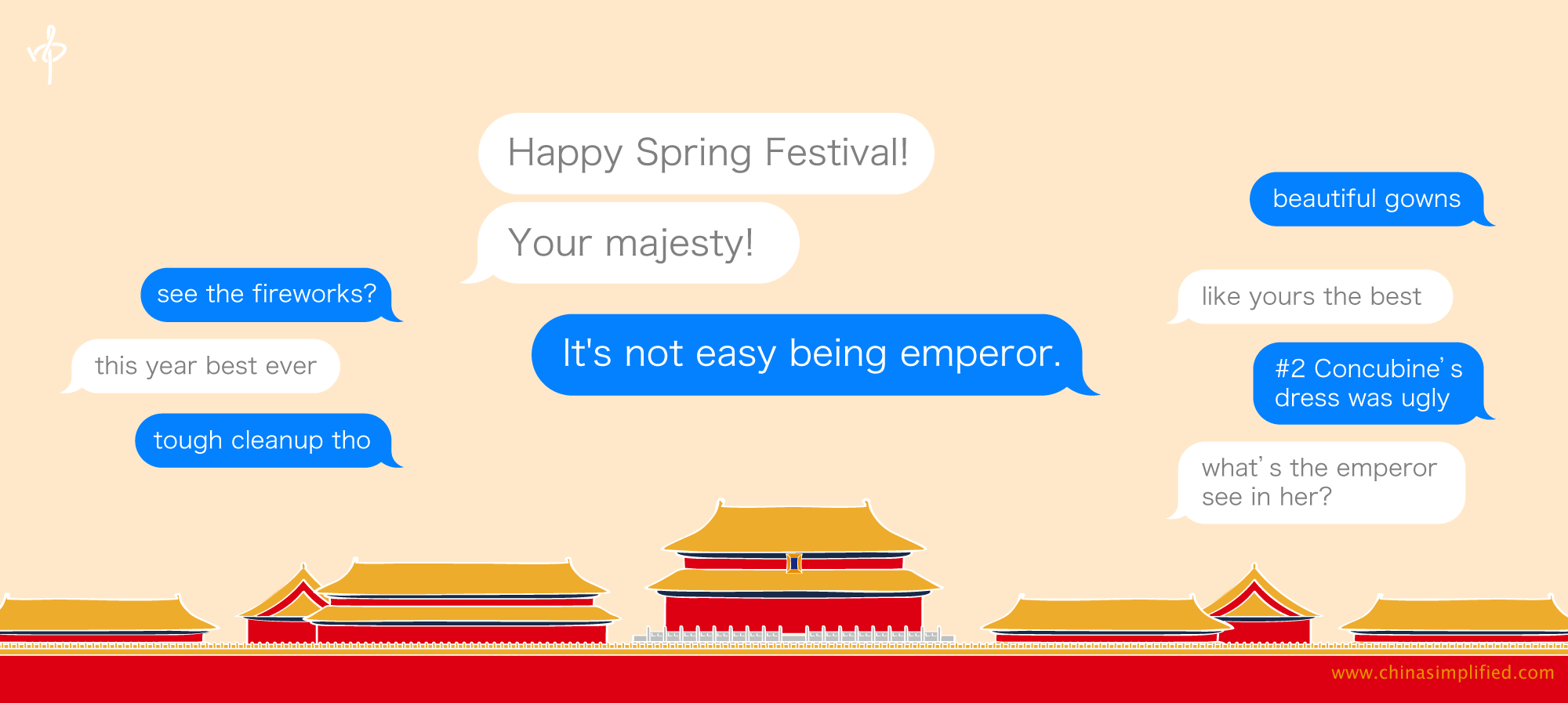Start your Spring Festival chūnjié 春节 with eight auspicious actions drawing upon traditions honed over centuries by the emperor and his entourage.
The biggest celebration. The biggest household. That’s Spring Festival in the Forbidden City of Beijing during the Ming and Qing Dynasties. A total of 24 emperors from two families – the Zhu (Han) and the Aisin-Gioro (Manchu) – reigned for over 500 years through the two final imperial dynasties of China.
Although habits and passions differed from one emperor to the next, the Forbidden City’s enormous Square of Supreme Harmony would each year bear witness to its three most significant celebrations:
- Spring Festival (aka Chinese New Year)
- Emperor’s Birthday
- Winter Solstice
Traditions and customs varied somewhat between the Han and Manchu, but the goodwill and festive gestures of the Chinese New Year inspired their followers and resonated throughout the empire.
Let’s have a look at eight of the many ways the emperors prepared and celebrated the Spring Festival in order to draw out what might help us get off to a better new year start:
1. Clean house
- Emperor’s ideal: The emperor’s servants performed a thorough cleansing of the Forbidden City before Chinese New Year, including mopping every corner in the royal quarters, polishing the jewelry and cleaning Buddha statues. Basically, everyone worked nonstop to get everything shining bright.
- You might try: Okay, we don’t all live in the Forbidden City surrounded by priceless jewelry and rare antiquities. We all, however, can benefit from clearing away the past year’s clutter. Disposing of this mess and rubbish symbolizes the removal of any inauspicious qì (气 energy) or lingering bad luck. Moreover, no cleaning should be performed on New Year’s Day itself to avoid dispelling the good luck arriving with the New Year.
2. Make rice cakes
- Emperor’s ideal: Rice cakes were a favored food for their propitious phonetics. Niángāo (年糕 rice cakes) sounds like nián (年 year) + gāo (高 high), in other words, prosperity for the coming twelve months. Imperial rice cakes were handmade with rice flour, sugar and yeast. Steaming them was quite popular, and it’s said whosever rice cake steamed the tallest would receive the most blessings in the coming year.
- You might try: Rice cakes are available in most Chinese food markets. Steam or deep-fry ‘em and serve with sugar. Or slice and stir-fry with meat and vegetable. Hand-making holiday food, for many, has been replaced with a run to the corner market or even buying online on Taobao. It’s almost like the more things you stock up this time of year, the more abundance you feel entering the year, and hence, the less you worry.
3. Ink-brush holiday wishes
- Emperor’s ideal: Calligraphy writings on yellow, red or light green paper. They were often poetic and auspicious couplets, written vertically on two scrolls of paper and hung with symmetry as festive decorations. Even single word blessings such as shòu (寿 longevity) and fú (福 happiness) were popular.
- You might try: Hanging auspicious writings outside your door before Chinese New Year is similar to placing a carved pumpkin on your porch before Halloween night. Most modern spring couplets are black ink on red paper, ideally two lines on two vertical scrolls nicely rhyming with each other. You can purchase or do-it-yourself, then hang outside the door or inside at an attractive point of attention.
4. Host a family reunion
- Emperor’s ideal: The Forbidden City at peak times was highly populated with upwards of 100,000 servants and perhaps 3000 concubines, so sharing a meal with everyone was nearly impossible. The New Year’s Eve dinner was a rare reunion for the emperor with his family and high-ranking concubines plus selected children. After dinner there were stage shows, games and plenty of entertainment.
- You might try: The annual reunion dinner drives hundreds of millions of people long distances to be together with their families. One must-have dish is fish, or for vegetarians a fish-shaped veggie dish, in keeping with the blessing niánniányǒuyú (年年有余 lit. year after year surplus) which sounds like “year after year fish!”For entertainment, don’t worry about hiring a royal troupe for a stage show at your place. Join the other billion people tuning into one of the popular New Year’s Eve celebration shows on CCTV or another satellite tv channel.
5. Stay up late!
- Emperor’s ideal: Following the reunion dinner and entertainment, one of the last activities of the night would be servants making dumplings. Over time, it’s been known more as a North China than South China custom. Besides the positive symbolism and auspiciousness, dumplings are a practical choice for late night snacks.
- You might try: Think of it in Christmas terms – instead of putting the youngsters to bed early so Santa can fill the stockings, keep them up late to join in the fun and follow the traditional belief that whomever stays up past midnight will be blessed in the next year. (hint: sneak in a nap in the afternoon.) The midnight fireworks are going to keep you awake anyway!
6. Conduct a pen-opening ceremony
- Emperor’s ideal: On the first day of New Year, by tradition the emperor arises early after the late night for a pen-opening ceremony, meant to show his commitment to hard work in the coming year. The 24 emperors who resided in Forbidden City showed various degrees of dedication to this ideal. Some reckon the Qing emperors, especially the early ones, were more hardworking than the Ming emperors. The most egregious example was the Wanli emperor, who dodged morning meetings with his ministers for 28 years! Well, in his mind, he had a very good reason; it all started with them not liking his selection for his successor.
- You might try: Relaxing! Go ahead and take the morning off, unless you have something to prove, or a pen fetish.
7. Send New Year’s greetings
- Emperor’s ideal: After the early morning pen-opening ceremony, the emperor led more ceremonies, including sitting on the throne in the Square of Supreme Harmony to receive New Year’s greetings from officials and special guests. By the way, the Square of Supreme Harmony holds 70,000 people. This ceremony might take a while.
- You might try: Texting, wechatting and whatsapping your friends! Can you imagine how jealous the emperors would be if they found out future generations could lounge all morning in their pajamas and type New Year’s greetings into a magical hand held device?
8. Enjoy yourself until Lantern Day
- Emperor’s ideal: The New Year holiday officially ends with the Lantern Festival on the 15th day of the lunar new year, also called Yuán Xiāo Jíe (元宵节 lit. first night holiday), which coincides with the first full moon. Lanterns made of thin gauze were colored and shaped like animals, flowers and fruits. There were also dragon lantern dance shows and fireworks. Life the following day, for the emperor, returns to normal.
- You might try: During New Year’s Day week, feel free to welcome guests into your home or visit homes of friends. To brush up on your giving skills, revisit our recent post, Red Packs – Understanding When & How Much To Give.
The modern Chinese New Year has grown to become one of the biggest human celebrations on our planet. During the 40-day chūnyùn (春运 Spring Festival rush) people returning to their lǎojiā (老家 old home) often journey long distances squeezed into planes, trains and miànbāochē (面包车 vans, lit. bread trucks) with throngs of others during peak travel days. You might want to plan ahead and escape early!
How will you be celebrating your Chinese New Year?
Let us know in the comment section below.
Learn more about and keep track of
Upcoming Chinese Festivals and Other Holidays.










What is a pen opening ceremony?
Hi Colin, great question! On the first day of the Chinese New Year, the emperor will wake up at the first hour, wash up and head over to the study room. He then grinds some ink, light the candles, burn incense and pour a little herbal wine (traditionally drunk during Spring Festival). Every year, with a ceremonial pen used just for this occasion, he writes down his new year’s resolution e.g. to have a good harvest, peace and prosperity during the year. After he is done, he will personally put everything away. The document, he will place in a box. Nobody was allowed to open it. This ceremony was meant to bless the new year with good wishes and to motivate everyone for another year of hard work.
Um, don’t I have to bury a bunch of virgins in the foundations of my house for, like, auspicious insurance?
-dlj.
Well, it’s either that or build a second home in Xi’an above the non-excavated necropolis.